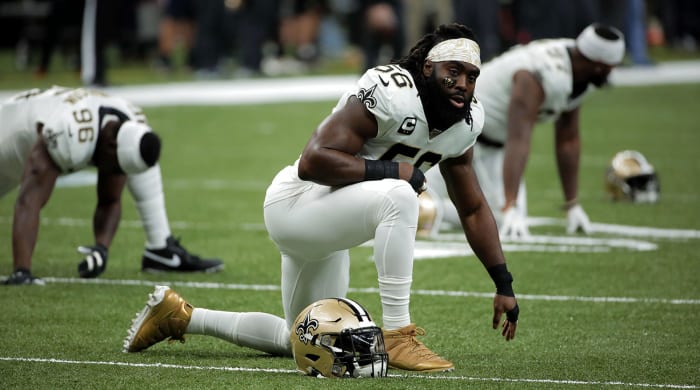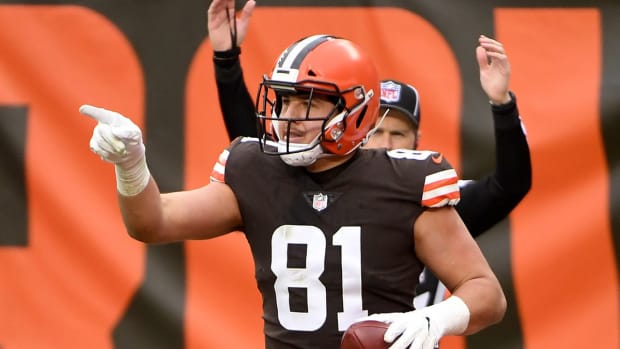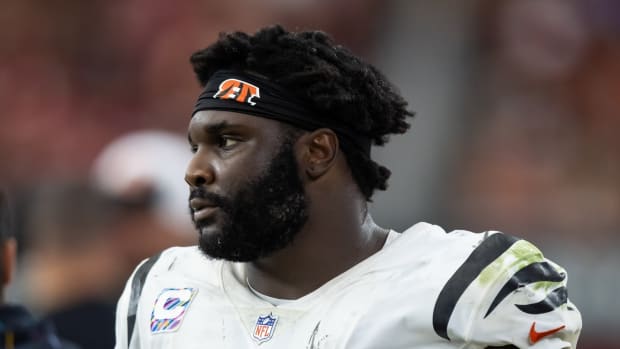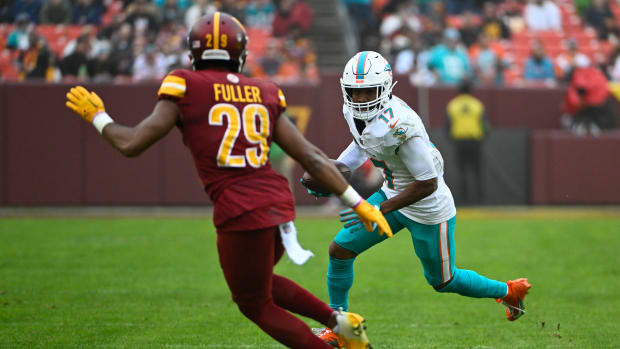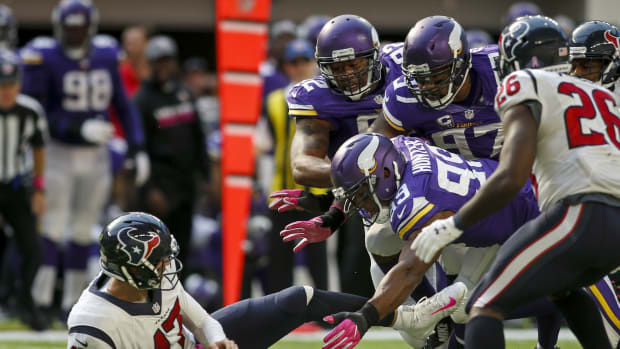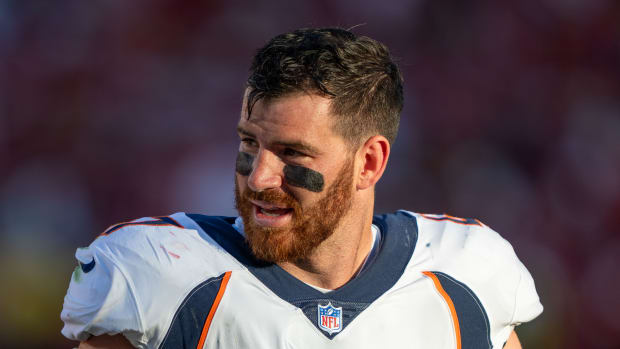Demario Davis on Working to Improve Community Relationships With Police
So what’s next?
Demario Davis isn’t wasting any time answering the question.
The Saints linebacker, like a lot of other NFL players, has been on the Zoom calls the last two weeks. He’s taken in what’s happening in America. And now, he’s out pounding the pavement, as our country goes through what sure feels like a reckoning, to find a way to create a better tomorrow.
The idea to do it actually came from Davis’s close friend Josh Norman—he and the new Bills corner worked together in the past to bring supplies to imprisoned kids at the border, and clean water to Flint, Mich.—and plans crystallized fast. Davis didn’t need convincing, and Norman didn’t feel like waiting.
“He felt like that’s what God told him to do, and he knows I’m gonna always roll with him,” Davis said, over the phone on Wednesday. “So when he called me, I made space in my schedule, and we started moving, calling it like a March Across America, starting in the South, coming out to the East Coast, and we’ll eventually make our way west, trying to get a general sentiment of what’s going on around country.”
In simple terms, that’s the idea of the whole thing, to put a finger on the pulse of the people in different corners of America. Davis and Norman started in Atlanta on Monday, were in Washington, D.C. on Tuesday and in Buffalo when Davis and I talked yesterday.
But, obviously, there’s more to it than just that. They’re canvassing community leaders, local politicians and police departments to try and get to the root of a problem that’s simmered in America for a long time and boiled over since Floyd’s death. As much as anything, they’re gathering information.
So if you ask what’s next, for Davis and Norman, this is it. And as they see it, what’s more significant is what should come after that.
***
We’re going to mix football and current events in this week’s column. So inside the GamePlan on this Thursday, you’ll find …
• My top contenders for Offensive Rookie of the Year.
• A list of those affected most by the Offseason of Corona.
• Some hope that owners are listening to their players.
But we’re starting with some really cool stuff two accomplished veterans are already doing to move the conversation on race in this country forward.
***
In a certain way, the mission for Davis and Norman here connects to what they did in Texas and what they did in Flint—they’re diving into what’s an acknowledged systemic problem and looking for voids they can fill.
The difference, this time, is what they’re looking for isn’t quite as tangible as bookbags for kids or water for families. What they’re looking for here, in having talked to Black Lives Matters groups and city officials in the places they’ve been, is to find the divide between large segments of people, and understand better where that void is coming from.
“It’s the heart of the people, and the sentiment from the ground, and also having the opportunity to meet with legislation, meet with mayors, meeting with police chiefs, getting to sit at the table with them,” Davis said. “And then seeing if the messages align and where the gaps are. And then understanding where the gaps are, where the miscommunication is, finding if there are areas to be diplomatic, is there a miscommunication altogether? Or does something need to be changed?
“That’s our role. Our goal always is to build bridges, not borders or barriers. Sometimes, you have a bridge and you can help people get to the other side. Sometimes, you need to build a new bridge, build a new way. That’s what we’ve been kicking around in these cities.”
By the time I talked to Davis, they’d already gotten somewhere with their mission.
The feedback Davis was getting pointed to two separate issues with the relationship between police and the public in black neighborhoods. In some, there just wasn’t a good one there, with distrust rife from years of problems. In others, it isn’t the officers themselves individually, so much as it is the number of them on the ground.
“It’s city officials that are over-policing,” Davis said. “They’re designating too many police to too many areas. You’re assigning police in schools, you’re assigning police in areas that you’re gentrifying. And over-policing areas is causing harassment. And in over-assigning police to different areas, you see these areas are predominantly black people, and the black people are the ones being harassed. So it’s not necessarily the relationship with the officers that’s the problem; it’s too many police officers in an area, and there are cultural biases.
“That’s allowing there to be tension between the people and the police officers.”
And from there, Davis and Norman have worked on solutions. As to the first problem, they’ve discussed helping to establish police flag football and basketball leagues, and having cops host cookouts and fairs to build trust between officers and kids, and further invest in departments in their communities.. “With ones having good standing, but there’s some tension in a few areas,” Davis said, “those are just about relationship building.”
The second problem is more complicated, and the Players Coalition petition that went out Wednesday (with signatures from over 1,100 players and coaches, and over 300 front office types across football, basketball and baseball) and called for an end to qualified immunity is a good step toward fixing what’s wrong. But there’s still a lot more to do, as Davis sees it, and another big step would be empowering good cops to call out the bad.
“The way the bad officers are acting is kind of the status quo,” Davis said. “And good cops might risk being ostracized, understanding, ‘This cop’s probably going to get off,’ knowing the cop who sticks up for the bad cops, that he doesn’t have consequences for doing that. So that’s what allows for these bad actors to have so much power, that and the power of police unions. We have to look at, how do we empower these good cops to say, ‘I can be a voice and stand up inside this department and not face being ostracized,’ and help good beat bad.”
As we talked, the question of defunding came up, too, and Davis emphasized how redistributing money that goes to police to help in other areas (drug rehab, sexual abuse rehab and mental illness were three he raised) would help, but added that “not all police departments need to be dismantled. A lot of them are doing well and have good relationships with their community.”
And that went to an overarching truth he’s found going through the country—all this stuff is local. That much was proven in his own work place last week.
***
Davis has been a captain both his years in New Orleans, so when any sort of adversity hits the locker room, he’s one of the guys responsible for addressing the problem. And so last week, when Drew Brees said he would “never agree with anybody disrespecting the flag,” and returning ex-Saints captain Malcolm Jenkins shot back at Brees with an emotional Instagram video, Davis was one of the guys who teammates were looking to.
Davis’s focus, it turns out, was similar to where is has been this week on his trip—he’d work to turn a negative into a positive, as best he could. And so far, so good on that.
“Drew’s been in a position of listening,” Davis said. “My goal is to help him with as much as he wants to be active in the black community. At the end of the day, we’re all gonna be judged by our actions, and my goal is to help him and all my teammates be able to turn their desire into being able to help the community with their actions. And I’ve always seen myself in that light. That’s the best role I can play.
“So he and everyone else will have a tremendous opportunity to turn their words into action, because there’s a tremendous amount of need. That can start immediately.”
And there’s another positive that’s come out of all this for Davis—it actually is starting immediately, and not just for him.
What he’s seeing now is younger (and yes, even some older) teammates who are well-intentioned, but need guidance, reaching out to figure out what they can do. The first step from there for everyone, as Davis sees it, is giving them a baseline of knowledge to work from.
“A lot of my teammates have been reaching out, asking how they can get involved,” Davis said. “So I’ve been equipping them with books. I’ve been equipping them with the research database we have at the Players Coalition to get them more information, connecting them to different opportunities where they can get involved. So much of it now is turning awareness into action. … It’s been an overwhelming amount of support with guys that wanna be about the cause. So looking forward, it’s about continuing to mobilize that into action.”
For his part, Sean Payton’s brought speakers like Shaquille O’Neal and Spike Lee in over the last couple weeks to further the discussions. To his credit, Davis is very disciplined about not spilling what’s discussed behind closed doors.
But he’ll concede that it’s been productive, reflecting what he’s seeing across the country.
***
So here, then, is another plus for Davis in this effort versus others he’s undertaken—he and Norman don’t feel alone now. Instead, for them, it’s more like they’re on the front lines of a movement, rather than trying to rally troops to the battlefield.
“You definitely can sense something’s in the air,” Davis said. “And it’s on all of us. I read a report that said, with the pandemic, it’s halftime in America. When we come back, there’s no going back to the way we did things in the first half. Now, it’s about making adjustments, changing, and changing immediately, so that we can have success in the future.”
Accordingly, those changes are apparent in the streets that Davis has been to this week.
“I’m definitely encouraged, because of the amount of people that are in the streets, that are fighting on behalf of black people nationwide and worldwide,” Davis said. “Yet, I still know what it means to be a black man in America. And black people have almost gotten to change many times. So psychologically, what that does to a black person is to make them doubt or make them feel hopeless. The reason I’m hopeful is my faith is strong, but also there are so many people this time from all different backgrounds that are not remaining silent.
“They’re getting active, and getting in the game, and getting in the fight. And that’s what black people have been needing for so long. And now that we have so many different parties fighting on behalf of black people, I think we really can have change in our country that’s long overdue. We may finally be able to cash the checks for justice.”
And until that happens? Davis plans to keep writing them.
***
POWER RANKINGS
Continuing our 2020 awards series (see last week’s column for my DROY favorite), here are my top contenders for Offensive Rookie of the Year, complete with their odds of winning it, per oddsshark.com. …
1) Joe Burrow, QB, Bengals (+225): The bottom line is he’s probably starting from the jump, and quarterback performance is graded on a curve when compared with other rookies. There’s also this: That team around him isn’t bad. He’ll be throwing to A.J. Green, Tyler Boyd and Tee Higgins, he’ll have Joe Mixon and Gio Bernard behind him and left tackle Jonah Williams should be a change agent for the O-line, after missing the entirety of his rookie year.
2) Jonathan Taylor, RB, Colts (+900): Call this a hunch. This kid is a 227-pound bruiser with 4.3 in the 40 and 6,000 yards of production in three Big 10 seasons. And I think he’ll prove a better receiver than you may think. Plus, he’ll be running behind Anthony Castonzo, Quenton Nelson and Ryan Kelly. Mark it down, I wouldn’t be stunned to see a 1,200-yard season from Taylor.
3) Tua Tagovailoa, QB, Dolphins (+750): I’m putting him here on the premise that Miami could get to six or seven wins, and if Tagovailoa’s the quarterback that gets them there, he’ll get a lot of credit for it. I also think Tua is very pro-ready though I worry, as I do with Justin Herbert, about how good the big men in front of him will be.
4) Brandon Aiyuk, WR, 49ers (+3000): Kyle Shanahan has a very clear vision for his receivers, and you’ll see quickly that’s true of Aiyuk. Plus, he showed last year his ability to get rookie production out of the position (Deebo Samuel had 57 catches for 802 yards and three scores). So I think Aiyuk will be the quickest to translate of the rookie receivers, and he’s my top contender among them for OROY.
5) Henry Ruggs, WR, Raiders (+2200): All you heard pre-draft was how the Bama coaches, who are routinely honest with scouts, would rave about how diligent and tough Ruggs is. That tells me he’ll be ready to go when camp starts, and ready to produce when the season gets going. The one thing Ruggs has on his side—he’ll have the types of wow plays that can swing these awards.
Now, if you look at the Odds Shark numbers, Chiefs RB Clyde Edwards-Helaire actually has the second-shortest odds to win OROY. Why don’t I have him here? I’m just not sure he’ll see the ball as much as some of the other guys, with the amount of skill position talent that K.C. has around Patrick Mahomes. And ultimately, Rookie of the Year awards often come down to the amount of opportunity guys have. Burrow will have a lot. I believe Taylor will, too. I think Edwards-Helaire will have a little less.
***
THE BIG QUESTION
Who is going to be hurt by the truncated offseason?
Since we’re approaching the close of the offseason program (there are two weeks left until the negotiated end date of June 26), I figured this was as good a time as any to look at which players have wound up with the short end of the stick here. Among them …
Second-year quarterbacks: You often hear the offseason between Year 1 and 2 is critical for growth, and that’s especially true at the most important position, where correcting all that went wrong during the rookie year is important. Kyler Murray, Daniel Jones and Dwayne Haskins have done what they can to do that anyway, of course, but not getting to do it in-house, with their own coaches stings a little bit.
Veterans in new places: And this particularly goes for guys in the passing game, where timing, knowledge of scheme and time on task in crucial. Will Marcus Mariota be in a position to earn playing time in camp? Will Stefon Diggs take some time to get where he needs to be with Josh Allen? How will Baker Mayfield and Austin Hooper mesh, with the big-money tight end new in Cleveland? These are all fair questions.
Undrafted free agents: Reps are going to be at a premium in camp, so guys like Diggs and Hooper can get up to speed, and so everyone is ready for the season with just 16 padded practices allowable under the new CBA. (Normally, they’d have the spring to establish themselves and earn summer practice reps.) That means less opportunity for undrafted free agents to prove themselves—meaning they’ll really need to stand out with whatever shot they get.
Veterans hanging on: Ron Rivera was asked about Antonio Brown on Wednesday and said that Washington wants to look at its young guys before diving into the idea of bringing him in. And in a normal offseason, you’d spend May and June doing that, with jobs for 30-somethings popping up in July and August as teams would come to honest assessments of their rosters. This year, teams will have to sort through that stuff in the summer, which may limit opportunity for older guys.
Tryout guys: This sounds like a little thing, but some dreams may die on the vine here. Adam Thielen and Malcolm Butler are two examples of guys who were invited to weekend rookie minicamps as roster fillers, earned free-agent contracts, and wound up making tens of millions as pros. Unless a rookie minicamp is baked into the re-acclimation period, that opportunity is going to vanish, meaning a lot of these guys—who already missed the chance to have pre-draft pro days—are gonna have to find other ways to get noticed.
New coaches: We’ve been over this. Rivera’s been there before (his first year as a head coach was coming out of the 2011 lockout), and Mike McCarthy’s got 13 years of head-coaching experience and a veteran team in Dallas. Carolina’s Matt Rhule, at least, has had to be creative with hours in the past, having been a college coach (that’s where then Niners coach Jim Harbaugh was going into 2011). First-time head coaches Kevin Stefanski and Joe Judge face a stiffer challenge.
***
WHAT NO ONE IS TALKING ABOUT
That the NFL’s failure in 2018 was a reluctance to listen to its players—and it seems very real progress is being made on that front.
In yesterday’s mailbag, we detailed how owners voted through a new anthem policy in May 2018 without so much as consulting the union, which incensed a lot of players. The one owner that I know was actively consulting the guys on his roster while that meeting was going on was San Francisco’s Jed York, and York just so happened to be the only one not to vote for the new policy on that spring day in Atlanta. (He abstained, and the final vote was 31-0.)
You know the rest. The players pushed back. The owners wound up working with them. The anthem policy was never enacted.
Two years later, it at least looks like the owners learned something from that, and the league office certainly has. Those who’ve been around the NFL for long enough know the story of how ex-Cowboys president Tex Schramm once addressed union executive director Gene Upshaw, telling him, “Here’s what you have to understand—we’re the ranchers, and you’re the cattle, and we can always get more cattle.” Really, that’s been the owners’ ethos forever in their relationship with the players and their union.
Is that changing? Slowly, it might be. Roger Goodell was listening to the players when he responded as he did to the video some of the sport’s biggest stars put together last week, and I’ve heard plenty of stories of owners and team presidents being on Zoom calls to hear what their guys had to share during a tense time in our country the last couple weeks.
And it makes sense that they would, because here’s the thing—not listening in 2018 generated a self-created mess over that summer and into that fall that easily could’ve been avoided.
I’d hope they’re smart and self-aware enough to have noticed that. The good news is, this recent evidence suggests that they are.
***
THE FINAL WORD
A bunch of teams are wrapping up their virtual programs Friday, two weeks earlier than they have to. Why? Because in most cases, they feel like they’ve done all they can over the computer. And coaches want to give their players the time over the next couple of weeks to do field work with their teammates.
So it’s definitely almost summer in the NFL.
• Question or comment? Email us.
































